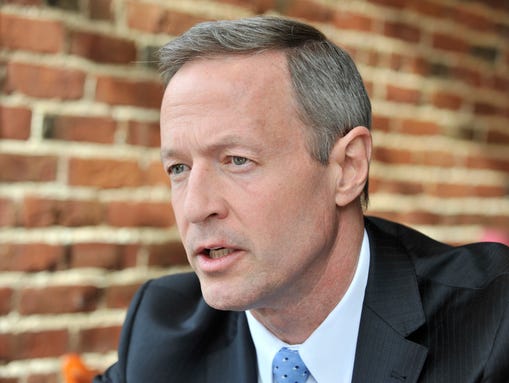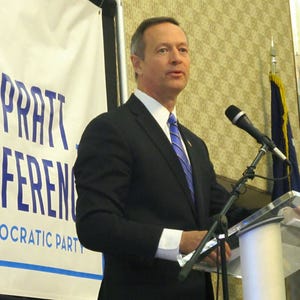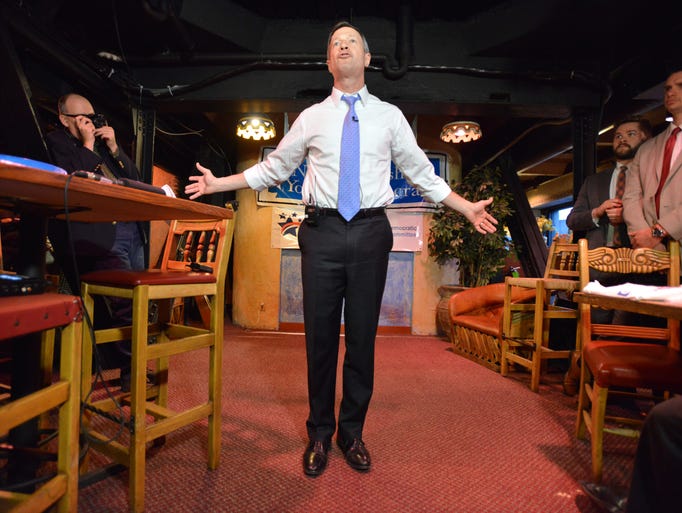
Martin O'Malley gives an interview in Concord, N.H. (Photo: Josh T. Reynolds, for USA TODAY)
USA TODAY reporter Martha Moore interviews former Maryland Governor Martin O'Malley during his recent trip to New Hampshire. Josh Reynolds for USA TODAY
NASHUA, N.H. — With his shirtsleeves rolled up but his tie still in place, his hands cradling a borrowed guitar, Martin O'Malley is singing to the Young Democrats.
O'Malley, a former two-term Maryland governor and likely presidential candidate, usually plays in an Irish rock band, but tonight's tune is This Land is Your Land , a song that's both patriotic — every school kid learns it — and political: It was written by Woody Guthrie as a leftist rebuke to God Bless America.
That's O'Malley's pitch to voters right now: a call to greatness combined with populist rage against Wall Street, similar to that of Sen. Elizabeth Warren , the Massachusetts Democrat who has resisted calls to run for president herself. But while the prospect of a Warren candidacy has stirred excitement among many liberal activists, O'Malley's much more likely bid has so far failed to register in opinion polls. Whether his new message resonates with voters in coming months could determine whether a path exists for him to emerge as a credible alternative to Hillary Clinton .
A NEW MESSAGE
O'Malley proposes a reinstatement of the Glass-Steagall separation of commercial and investment banks, a breakup of banks considered "too big to fail,'' and a three-strikes rule for bank CEOs.
"There is no reason that billionaires should crowd us out from our democracy,'' O'Malley told the crowd Tuesday night. "Do you want this to be a country where only the rich can get ahead?"
Until recently, O'Malley's pitch focused on his record as an effective, data-driven mayor and governor who also helped enact liberal priorities in Maryland, including same-sex marriage, a higher minimum wage, in-state tuition and driver's licenses for undocumented immigrants and an end to the death penalty.
He still talks about the need for elected leaders to "get things done,'' but in a Politics and Eggs breakfast in Bedford, N.H. — a regular ritual for presidential hopefuls — he focused on concentration of wealth and falling wages for the middle class.
When did he start channeling Elizabeth Warren? Like every other governor, O'Malley says, he saw the damage of the foreclosure crisis and the recession that followed the 2008 financial meltdown.
"It's not a matter of getting religion. It's a matter of getting how badly this behavior damaged people throughout our country,'' he told USA TODAY in an interview Tuesday.
As O'Malley makes trip after trip to early primary states, testing the waters for the presidential ambitions he's had since at least 2013, he barely registers in public opinion surveys. Clinton, who is expected to announce her candidacy this month, dominates the Democratic field.
CHALLENGING HIS PARTY
New Hampshire Democrats are longtime Clinton fans — she won here in 2008 — but O'Malley gets a warm welcome, because the only thing voters here like more than their presidential primary is a furiously contested presidential primary.
"Even if you want Hillary to be the nominee, you still want her to get put through her paces. She needs to get sharpened,'' says Vicki Meagher, a playwright at the Young Democrats event who says she'd be happy to vote for O'Malley over Clinton in the primary. "I think Hillary's time has passed.''
Melanie Levesque, a former state representative, is already pledged to Clinton because they go "way back,'' but she wants O'Malley to run anyway. "We definitely need to have some kind of debate.''
O'Malley, 52, mentions Clinton as little as possible, though his references to "fresh" and "new" leadership aren't that hard to figure out, and he isn't the first to imply that Clinton's Wall Street donors might make her less enthusiastic about reining in the financial industry.
"People are looking for a leader independent of powerful, wealthy special interests that always push to the front of the line,'' he says. He won't say he's more liberal than Clinton — politics isn't left or right but "forward or back,'' he says. "I do believe I'm speaking to where our country's going and not to where it's been.''
As for where he differs on the issues, he opposes the planned Trans-Pacific Partnership trade pact, which Clinton supported as secretary of State, and is no fan of NAFTA, a signature achievement of President Bill Clinton .
"I'm not for the sort of trade deals that hollow out our standards while they hollow out our middle class and middle class wages," he says.
Yet O'Malley has been a faithful party soldier. He raised millions as chairman of the Democratic Governors Association in 2012 and travels the country constantly fundraising for candidates and Democratic Party organizations, He's sent money and staff from his O'Say Can You See political action committee to help in local and statewide races: last year he sent 14 staffers and $50,000 in contributions just to Iowa, site of the first presidential caucus.
But he doubts his own party is willing to impose the regulations on Wall Street he wants. "I don't. Not yet,'' he says.
"For 30 years we have followed this economic story that sought to change rules, change laws, change regulations to concentrate wealth at the very top,'' he says. "That concentrated wealth now totally owns, in my opinion, the Republican Party and is trying to totally intimidate the Democratic Party. And in many cases they're succeeding.''
He cites the efforts in Congress to dilute the Dodd-Frank financial services law by attaching changes to a December budget bill needed to keep the government open. J.P. Morgan Chase CEO Jamie Dimon personally lobbied for the provisions.
"There was kind of a 'Jamie Dimon rider' on closing down our" government, O'Malley says. "It was appalling.''
ANOTHER MIRACLE?
O'Malley says he'll announce a decision on running before spring is over. While he acknowledges that announcing early is often better for a candidate who struggles with name recognition, there are "familial, organizational, logistical'' considerations still to be dealt with. Letting Clinton announce first would also give O'Malley the opportunity to assess her message and see whether she is a smoother campaigner than her tense email press conference would suggest.
The Politics and Eggs crowd included some fans from O'Malley's years as a git-er-done mayor and governor and some old buddies from his days as a volunteer on Gary Hart 's 1984 campaign — when the Colorado senator defeated former vice presidentWalter Mondale in the New Hampshire primary.
Billy Shore, founder of Share Our Strength , a national anti-hunger group and a veteran of the Hart campaign, came up from Boston to see O'Malley speak.
Clinton's fundraising potential will make it a "real uphill race'' for O'Malley, Shore says, but he likes O'Malley's ideas, executive experience, and "his independence, frankly, and his willingness to do things that aren't necessarily politically popular... To me that's real leadership.''
And as invincible as a Clinton candidacy seems in 2016, the 1984 Hart campaign is a source of hope for at least one O'Malley supporter.
Mondale had "all the money, all the big names'' Dan Calegari, a Manchester social worker, said at the breakfast — yet Hart won anyway.
"We participated in a miracle once, we can do it again," he said.




No comments:
Post a Comment